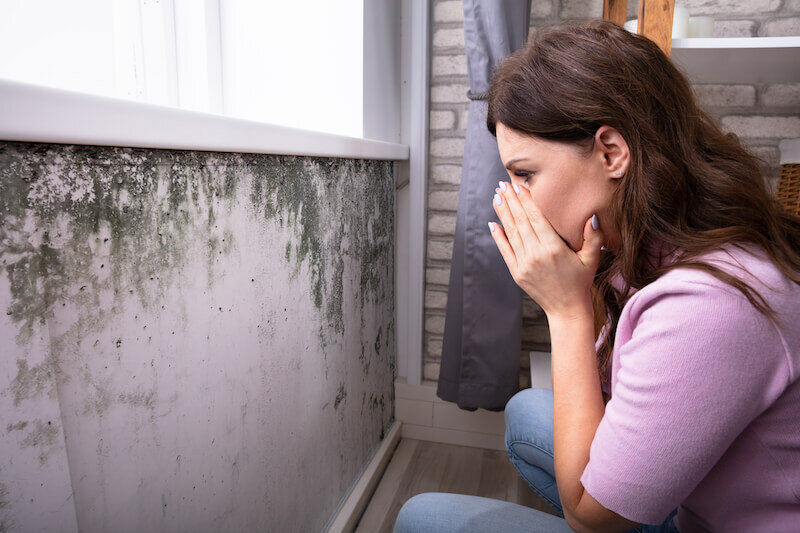When the time comes for you to sell your NJ house, there will be a lot of things that you must consider before taking any steps. For starters, you’ll want to think about whether you will be selling your property as-is without investing any money into repairs or renovation or whether you’d like to increase its value by freshening it up. A lot of times, the reality is that you’ve become so used to all that is not right with your home that you stop noticing it and assume it is normal.
However, problems such as mold growth in the house will certainly be a factor that could easily break a deal with potential buyers. We’re here to provide useful information on all that you need to know about selling a house with mold.
Sell A House With Mold In NJ

What are House Molds?
If you’ve never come across house molds it’s safe to say that you’re a lucky one. Although there are a wide variety of mold types, they all have one thing in common – they are a form of fungus and they are extremely resistant, making them difficult to get rid of.
The small organisms can be seen in black, white, orange, green, and purple shades and can literally make a home anywhere, regardless of whether it is outdoors or indoors. They thrive in moist, damp, and wet areas, reproducing quickly via lightweight spores that make their way through the air. The spores are not easily seen and there’s no certain way of preventing their spread. They can even live in places where mold is not able to grow and develop.
Mold isn’t limited to a certain surface. It can develop on fabric, plastic, glass, wood, walls, and so much more, meaning that no area in the house is exempt from the chance of being attacked by mold. In some cases the mold may begin to feed off the surface it is using for home and cause serious destruction to your property.
Asses the Mold Issue of the House
Your property may have been affected by mold without you even realizing the growth of the fungus around you. So what can you do to identify whether there is any mold in the house and how serious the problem is?
Some of the common signs of mold growth in your home include:
- There are visible mold spores around the house
- You are feeling cold-like symptoms, coughing, and fatigue
- You are coming across unfamiliar and musty odors at home
- You’re suffering occasional nosebleeds
Know Where the Mold Growth Is
Before you can deal with the mold, it’s essential to identify its exact location. Although it could be anywhere, there are a few popular places for the fungus to be hiding. These include:
- The shower – As the shower along with the bathtub are both places that are moist most of the time, they easily attract mold if poorly ventilated.
- The sink – Your sink’s surface and counters are not regularly cleaned and dried, mold may soon be on its way.
- The toilet – Take a look around your toilet, even the toothbrush caddies, around any bathroom storage space that stores moisture.
- On the walls – Although mold could start from the bathroom, it easily spreads around the house. Check the walls for any signs of dampness and moisture if you can’t yet spot the vivid black moldy spots.
- On the floor – Inspect your floors including the rugs and carpets.
- In the kitchen – The refrigerator is also a common spot that mold attacks. Also check under the kitchen sink, your pantry, microwave, and stove.
Identify the Main Cause of Molds in Your Home
The next thing to do is to uncover the reason why mold made its way to your house. Apart from calling an expert to inspect your home, there are a few things you can do yourself. For example, you could check for any current plumbing leaks or previous ones. There could also be leaks on your home’s exterior, like the walls, ceiling, or door. Next up is to check the ductwork. If it has been poorly insulated there is a chance of water formations on the ducts to cause condensation and therefore mold.
Fix the Mold Problem
So now that you’ve established the condition of your home, there are a few things to consider when selling a house with mold. A lot of home buyers will be put off by seeing unsightly spores in a home they could potentially be interested in. One of the ways to avoid this is by fixing the problem. The best recommendation is to hire a professional exterminator who could successfully eliminate any signs of fungus and prevent its future spread.
However, if you do decide to take on the task by yourself, you could use chlorine bleach, hydrogen peroxide, a combination of water and vinegar, or baking soda with borax to get rid of the fungus. All of these products do a great job removing mold but could also sometimes harm the surface underneath.
Sell Your House As-Is
Another option that you have is to simply try to sell the home as-is, without investing any time or money into the battle with this nuance. However, keep in mind that it is highly recommended to notify the potential buyers about the condition of your home via a mold disclosure in NJ. Even if you’ve solved the problem, disclose any previous mold issues that the property had along with the steps you took to overcome them.
Advantages of Selling a House with Mold
Selling a home with mold may not sound like the greatest ideas of all times but it does come along with a few advantages for the seller. For starters, there are no repair costs and additional expenses on mold elimination services. Keep in mind that when you start fighting mold, it could turn out that that’s not the only thing you need to repair as it has damaged the surface beneath.
In addition, selling your home as-is is easier as a process and helps you stay away from lengthy pre-sale inspections, repairs, renovations, open houses, and more.
Disadvantages of Selling a House with Mold
On the other hand, there are some drawbacks that should also be considered. Selling your home with mold in an as-is condition will undoubtedly lead to a lower sales price. You may not be able to get the amount that you’re after, considering the economic situation and your location. Additionally, you are likely to communicate with buyers who don’t completely trust you as a seller of an as-is home. Although sellers are required to announce the flaws of the property, buyers remain skeptical that not all problems are properly disclosed.
Overall, homes being sold as-is usually attract fewer buyers and take a longer time to sell.
CTA: Get more ideas about how you can sell your house with mold and learn how to sell it is a more reasonable cost.
Ways to Sell a House With Mold
On the bright side, there are few options that you have when it comes to selling your home without ridding it of its mold problem first. The three main roads you could take are selling to investors, getting a realtor, and finally – selling it by yourself. Let’s look at these in more detail.

Sell to an Investor
Property investors are usually a great source of financial opportunity to go to if you are looking to sell your property as-is, especially if it has mold problems. Investors usually have a lot of financial stability and won’t be affected by the need to renovate or repair the house to get rid of potential problems. Additionally, due to the experience they have, they can quickly react by finding the right specialist to take care of the problem. You also don’t have to lower the price as much as you would when selling to buyers. We buy houses and can help you quickly sell your property!
Get a Realtor
Alternatively, you could also get in touch with a professional realtor who can help you with the selling process. These experts are members of the National Association of Realtors and have the know-how and expertise to present your property in a way that will attract potential buyers. They will also handle all the property viewings for you and have your best interest at stake during the process.
Sell It Yourself
If working with an investor or a realtor is not something you’re happy to explore, the final option is to sell the house yourself. This option is likely to take the most time and be of the highest risk due to a number of reasons. First, you will need to present your home in its best version, despite the fungus problems that you are likely aware of. You will also need to ensure that you are legally prepared for the selling process. Additionally, you must remember to be as open as possible and disclose the mold issues unless you want to risk entering legal conflicts and disputes with potential buyers.
Conclusion
There are several ways to sell a house with mold in NJ. We hope that the information we’ve provided will help you become more familiar with the alternatives and will make you more informed. Make sure to choose the best option for you.
